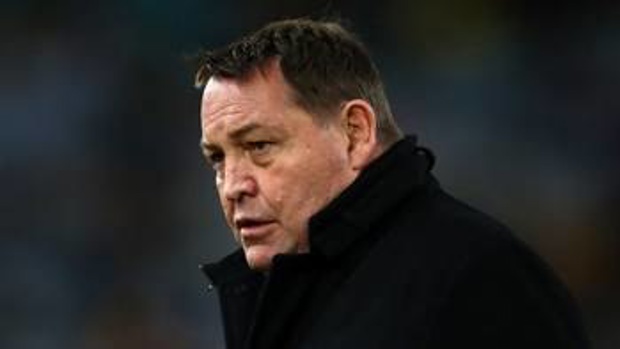Dylan Cleaver: No, the All Blacks don't need more government funding
- Publish Date
- Tuesday, 28 August 2018, 11:00AM

Getty Images
No Steves, the All Blacks don't need more government funding.
To stretch the point further, there are about 100 sports and 1000 things in desperate need of taxpayer money before the All Blacks, the most commercially juiced team in New Zealand sports history.
Steve Hansen's plea, delivered in that laconic drawl that blurs the line between serious and satire, struck the only discordant note of an otherwise spectacular night at Eden Park.
The fact his comments were doubled down by his boss, Steve Tew, today, gives the unescapable impression they're not trying for irony here.
This is not Waldorf and Statler looking for a laugh or two, but it is two grumpy old men lacking a little perspective.
It is the wrong message at the wrong time.
"I said to Grant Robertson: You guys should be our biggest sponsors because we're their biggest brand. Could she [Jacinda Ardern] find some money to help us compete against the likes of England and France so we can keep our players."
There's a bit to break down there, most notably the belief the All Blacks are the country's biggest brand.
They'd be right up there, but in reality "New Zealand" is New Zealand's biggest brand, and the carrier that gets about 1.5 million overseas folks here each year is a decent brand too.
There's a subtle difference between the All Blacks and Air New Zealand, too. We own half the national carrier. Hand over half the ownership of the All Blacks to the taxpayer and perhaps we'll be more inclined to line Beaudy's pockets with gold.
Fonterra's headline brand, Anchor, exports to a hell of a lot more countries than those who play rugby seriously, but perhaps the brand would have disappeared by now if it were not for the All Blacks promoting the bone-density properties of their products?
The argument we should fund an iconic brand is shallow and flawed, as is the idea we should do it to keep pace with the Joneses of England and Girards of France.
The riches in English and French domestic rugby flow not from the public purse but through the largesse of gazillionaire owners. There is not the same opportunity for that here because of the iron-grip New Zealand Rugby has on the professional game.
That grip serves the All Blacks well. You can't cut it both ways.
At the moment, rugby's curious ecosystem works fairly well for New Zealand Rugby and Brand All Blacks. The lure of playing for that iconic jersey and team keeps the vast majority of the best players here (and they are well remunerated by most New Zealander's standards), and cashed-up overseas competitions prove a fruitful option for many others.
There might be a tipping point in the future where it starts to hurt Brand All Blacks, but we're a long way from that moment yet.
As much as anything, though, it was the politicking that was most awkward.
The All Blacks cheerleader-in-chief for much of the past decade, John Key, and his servile sports minister Jonathan Coleman, must have visited the All Blacks changing rooms about 613 times, but it is difficult to remember Hansen being so public in his demands to them before.
Does he now see an adversary where he once saw a friend?
Only Hansen can answer that, but it's probably best he doesn't.
He was willing, however, to shed some light on Robertson's reaction to his funding suggestion.
"There wasn't a lot said after that," Hansen said, to predictable chuckles from his assembled acolytes.
Robertson was no doubt observing a mantra that Hansen would have done well to remember: If you've got nothing sensible to say, don't say anything at all.
This article was first published on nzherald.co.nz and is republished here with permission.
Take your Radio, Podcasts and Music with you

